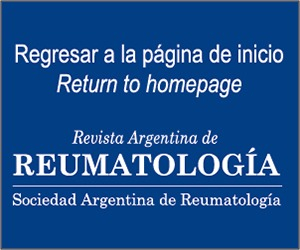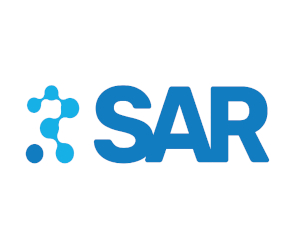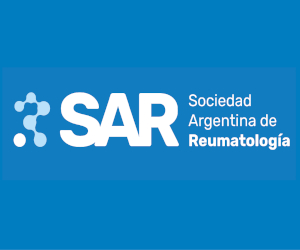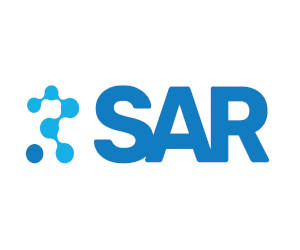| Language | |
 |
Español (España) |
 |
English |
About the Journal
Focus and scope
History of the Magazine
Editorial
Open access policy and use licenses
Indexing and inclusion
Costs per publication
Thematic scope of the sections
Peer review process
Responsibility of the authors
Plagiarism Policy
Digital preservation
Conflicts of interest
Ethics and good editorial practices
Privacy statement
Sponsors and sources of help
Focus and scope
The Argentine Journal of Rheumatology ISSN 0327-4411 (printed) ISSN 2362-3675 (online) is a scientific publication refereed by double-blind system, published every trimester (January/March, April/June, July/September, October/December).
It belongs to the Argentine Society of Rheumatology (Buenos Aires, Argentina), an institution founded in 1937 with the aim of contributing to the progress of Rheumatology in Argentina, promoting, stimulating, collaborating, participating and intervening in all kinds of basic research projects and studies. or clinic in all its phases. It brings together rheumatologists from all over the country.
The journal deals with scientific content in the area of Rheumatology. It includes both joint and soft tissue pathologies and autoimmune diseases, as well as their diagnostic and therapeutic methods. Epidemiological studies related to the area, case-control studies, cohorts, observational studies, case reports, and reviews are included. In addition, "Letters to the Editor" are received. Special topic “Editorial” articles are by invitation only.
Its objective is to communicate research and scientific updates from Argentina and Latin America on Rheumatology and related branches, to promote debate on the problems related to the specialty and provide the medical population with scientifically verifiable information.
It publishes original and unpublished articles on clinical or experimental research, reviews, updates, clinical cases and imaging diagnoses, among other aspects related to the health of people with rheumatological pathologies, which have not been presented or published in other journals or dissemination media scientific
Aimed at specialist physicians in the reference pathology, researchers and teachers, the publication is published in Spanish and English. Papers are received and published in both languages.
It reserves the right to accept or not the contributions received, in accordance with its thematic scope and in compliance with its editorial standards.
Declares its openness to the participation of authors outside the publishing entity. At least 60% of the content of the publication has the character of original research within the scientific and academic field.
The Journal has no article processing charges (APC) or article submission.
The first official publication of the Argentine Society of Rheumatology was the Bulletin of the Argentine League Against Rheumatism, the first issue of which appeared in October 1938. In 1950 it was replaced by the Argentine Archives of Rheumatology. In June 1990, the first issue of the Revista Argentina de Reumatología was published, a scientific publication that became the official dissemination organ of the Argentine Society of Rheumatology. Since then and until today, this journal has been published uninterruptedly thanks to the tireless efforts of a large number of prestigious rheumatologists who have contributed their scientific production as authors, or who have collaborated as editors, members of the scientific committee or reviewers.
Argentine Society of Rheumatology
Av. Callao 384, 2nd floor apartment. 6 (C1022AAQ), City of Buenos Aires, Argentina.
Phone: (5411) 4371-1759 / 4371 1643.
sociedad@reumatologia.org.ar
Sello Editorial Lugones® of Editorial Biotecnológica S.R.L.
Av. Curapaligüe 202, 9th floor, office. B (1406), Buenos Aires, Argentina.
Phone: (5411) 4632-0701 / 4634-1481.
administracion@lugones.com.ar
Open access policy and use licenses
Openness / free: access to the contents published in this magazine is open, free and free, in full text and without temporary embargoes. The Journal maintains its commitment to open access policies to scientific information, considering that both scientific publications and research financed with public funds must circulate on the Internet freely, free of charge and without restrictions.
Legal records: National Directorate of Copyright, Ministry of Justice and Human Rights of the Argentine Republic: Record of Periodical Publications in File No.RL-2023-67258517.
The Journal is licensed under the Creative Commons Attribution - Non-Commercial - No Derivative Work 4.0 International License.
This publication adheres to the Budapest Open Access Initiative, putting its recommendations and definitions into practice.

The same license and rights of use apply for the website in general as for each issue and article published. The authors maintain full and exclusive control over the integrity of their published work, as well as the right to be cited and duly acknowledged. It adheres in all cases to the guidelines and their respective practices for fair use "Fair use" developed by DOAJ.
Consult the "Submissions" page to know the rules for authors.
The authors maintain the copyright of their published articles without restrictions and grant the Argentine Society of Rheumatology permanently the rights of reproduction of their work to preserve it and put it in open access in whole or in part through digital media and channels. Institutional institutions in force, under the same original use license for publication in the journal or with the same characteristics.
The Magazine integrates the following indexes, bases and catalogs:

Basic Nucleus of Argentine Scientific Journals

Latindex Directory and Online Magazines
The Journal does not apply charges in any of the cases indicated:
- For access to the full text of all issues and articles.
- Sending of originals.
- Evaluation and processing of approved articles.
Thematic scope of the sections
Magazine Sections:
- Editorial: contribution requested by the Committee to an expert, who from a personal point of view writes on topics of current interest. This section is not peer-reviewed and its content is not exclusively scientific in nature.
- Original articles: presentation of an original, personal or group scientific experience that contributes to the progress of the specialty. Section subject to peer review and exclusively scientific content.
- Updates: updating on certain topics of interest, presented in a synthetic way. Section subject to peer review and exclusively scientific content.
- Clinical cases: description of a case of rare observation that makes an important contribution to the knowledge of the subject. Section subject to peer review and exclusively scientific content.
- Imaging diagnosis: presentation of a problem case based on imaging diagnosis, with essential clinical data and sequence of studies carried out to reach a definitive diagnosis. Section subject to peer evaluation and exclusively scientific content.
- Letters from readers: comments on previously published articles. Disclosure section not peer reviewed.
For more information on each section, you can visit the submission page: https://ojs.reumatologia.org.ar/index.php/revistaSAR/about/submissions
The Journal has external reviewers on each topic as well as new experts that are being incorporated. The Editor of each section reached by peer review submits the work to two or more external and blind reviewers. The term established to carry out the review is 30 days from the moment of acceptance of the evaluation request, with the exception of the summer and winter recess periods, which may be longer.
The Editorial Committee performs a prior review of the submissions received according to originality criteria and the rules for authors established in the Journal. If the requirements are met, the contribution will be given an editorial course, initially assigning 2 or more external reviewers, thus complying with the referral process. The double-blind peer evaluation method is applied.
The contributions sent and evaluated may adopt the following results: accepted to publish, accepted with changes, rejected. In case of discrepancy between the evaluators, the Director of the Journal decides. The final decision on the publication of an article rests with the Director.
The Editorial Committee reserves the right to make style corrections or eventually in the wording of certain phrases or expressions when they are not clear.
The responsibility for the considerations contemplated in the texts and respect for intellectual property corresponds to the authors. The authors, in the process of sending the original, declare that they have complied with international standards regarding conflict of interest and ethical standards for research and publication of academic and scientific material. The opinions expressed by the authors of the articles are their sole responsibility.
The collaboration of all participating roles is governed by the Principles of Transparency and Good Practice in Academic Publications of the Committee on Publication Ethics (COPE), https:/publicationethics.org.
All submissions are monitored through an online search and through plagiarism detection software plag.es.
If total or partial plagiarism is detected or the article already published by the same author is located, the journal will not publish the article, nor will it advance in the respective editorial process.
In the event that an article already published is denounced for plagiarism or for violating ethical standards, the Journal will immediately and shortly remove it from the portal, and will notify the author to exercise his right of defense. The publishing institution will decide in this regard, if plagiarism is confirmed, it will not be republished, nor will future contributions by the same authorship, otherwise it will be included again.
The LOCKSS system is used to create a distributed file on its content ensuring the generation of replicas. Actions are also carried out at the server level, as well as backup, preservation and archive policies, guaranteeing the reconstruction of the entire magazine collection and preservation of each published digital content.
The authors declare that they have no conflicts of interest with any institution or natural or legal person related or mentioned with the content of the submitted article. The same criteria are applied to the work of reviewers and editors, preventing them from interfering with the objectivity and / or transparency of the referral process.
Ethics and good editorial practices
For the administration of the editorial process, all participants must adhere to the Central Practices elaborated by the Committee on Publication Ethics (COPE).
In addition, it is also requested to adjust each practice to the following guidelines: Declaration of Helsinki of 2013 of the World Medical Association, Convention on the Rights of the Child of UNICEF, Convention on the Rights of Persons with Disabilities of the United Nations, ethical principles for human research, the principles of transparency and best practices established by the Publications Ethics Committee, DOAJ, the Association of Open Access Academic Publishers and the World Association of Medical Publishers, the White Paper on the Ethics of publications, developed by the Council of Science Editors; and the guide “Avoiding Plagiarism, Self-Plagiarism, and Other Questionable Writing Practices: A Guide to Ethical Writing” written by Miguel Roig, PhD, of St. Johns University with funding from ORIOffice of Research Integrity, and Declaration of San Francisco On Research Evaluation.
The names and e-mail addresses entered in this magazine will be used exclusively for the purposes declared by this magazine and will not be available for any other purpose or other person outside the magazine. The contact email that must appear in each article is excepted.
Sources of help
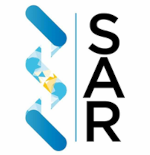
Advertising policy
The Journal is partially financed through advertisements of biomedical products, which are previously supervised and approved by the Directors of the Journal. These ads are displayed randomly, are not linked to content or reader behavior, are not related in any way to editorial decision-making and are always kept separate from published scientific articles.



